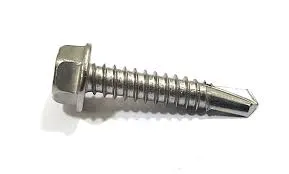types of self drilling screws
Types of Self-Drilling Screws A Comprehensive Overview
Self-drilling screws, also known as Tek screws, are a type of fastener that combines the functions of drilling and fastening into one efficient tool. They are characterized by their unique tip design that allows them to create their own hole in materials, primarily metal, wood, and plastic, without the need for pre-drilling. This feature simplifies the installation process, making them a popular choice in various construction and manufacturing applications. Here, we will explore the different types of self-drilling screws and their specific uses.
1. Type A Screws
Type A self-drilling screws are designed with a sharp point that allows for easy penetration into thin materials. They are primarily used in applications involving sheet metal or light gauge steel. Their versatility makes them suitable for roofing, siding, and manufacturing of appliances. Additionally, the thin profile and low threading of Type A screws ensure they create a tight grip without damaging the materials.
Type B screws are characterized by a larger drill point and deeper threads. This design is optimal for use in thicker materials such as heavier gauge metal. These screws provide excellent holding power and are often used in construction applications, particularly in structural steel connections and heavy-duty assembly jobs.
3. Type C Screws
types of self drilling screws

Type C self-drilling screws feature a pointed end that facilitates drilling through hard materials, including stainless steel or aluminum. They typically have a wider head, which helps distribute the load more evenly and reduces the risk of stripping. These screws are ideal for use in automotive, aerospace, and heavy machinery applications where high strength and durability are required.
4. Type D Screws
Type D screws are unique due to their special thread design, which allows them to drill into thicker materials while providing maximum holding power. They are often used in applications involving wood-to-metal fastening, such as in decking or metal framing. The tapered design also ensures a snug fit without damaging the surrounding material.
5. Coated Screws
In addition to the various types based on structure, self-drilling screws can also come with protective coatings. Zinc-plated and epoxy-coated screws offer corrosion resistance, making them suitable for outdoor applications or harsh environments. The coating extends the lifespan of the screws and maintains the integrity of the connection over time.
In summary, self-drilling screws represent a versatile and efficient fastening solution for various materials and applications. Understanding the different types and their specific uses allows builders, contractors, and DIY enthusiasts to select the right fastener for their projects, ultimately enhancing both safety and performance. Whether opting for Type A, B, C, or D screws, there’s a self-drilling screw tailored to meet the demands of any task, streamlining the assembly process and delivering lasting results.
-
Weatherproof Plastic Expansion Anchors for OutdoorNewsJun.06,2025
-
Sustainability in the Supply Chain: Eco-Friendly TEK Screws ProductionNewsJun.06,2025
-
Load-Bearing Capacity of External Insulation FixingsNewsJun.06,2025
-
Double Head Bolts: Enhancing Efficiency in Industrial MachineryNewsJun.06,2025
-
Corrosion Resistance in Chipboard Screws: Coatings for Wholesale DurabilityNewsJun.06,2025
-
Butterfly Toggle Bolts : Enhancing Structural ResilienceNewsJun.06,2025
